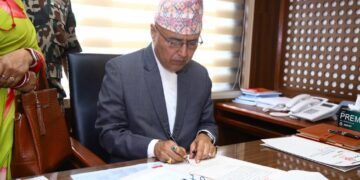Kulman Ghising, former Managing Director of the Nepal Electricity Authority (NEA), has taken charge of the Ministry of Energy, Water Resources, and Irrigation following his appointment as Energy Minister in the aftermath of the Gen-Z movement. His first directive: to recover long-standing dues from dedicated and trunk line users.
According to NEA, 28 industries owe around Rs 7 billion in unpaid bills for using such lines.
During his tenure as NEA chief, Ghising had aggressively pursued the collection of these dues, even cutting power to some industries. His actions triggered disputes with both industrialists and the government, ultimately leading to his removal. At the time, industries argued they were willing to pay if bills were issued based on Time-of-Day (ToD) meters.
To address the controversy, the government formed a commission under former Supreme Court Justice Girish Chandra Lal. However, disagreements emerged over the implementation of the Lal Commission’s recommendations, further prolonging the dispute.
The NEA also attempted stricter enforcement, at one point writing to freeze the bank accounts of 35 industries for failing to clear dues. But the authority struggled to issue bills using ToD meter readings, leaving the matter unresolved.
Now, as Energy Minister, Ghising has signaled his intention to settle the dispute once and for all, reiterating his long-held stance that the dues must be collected.










